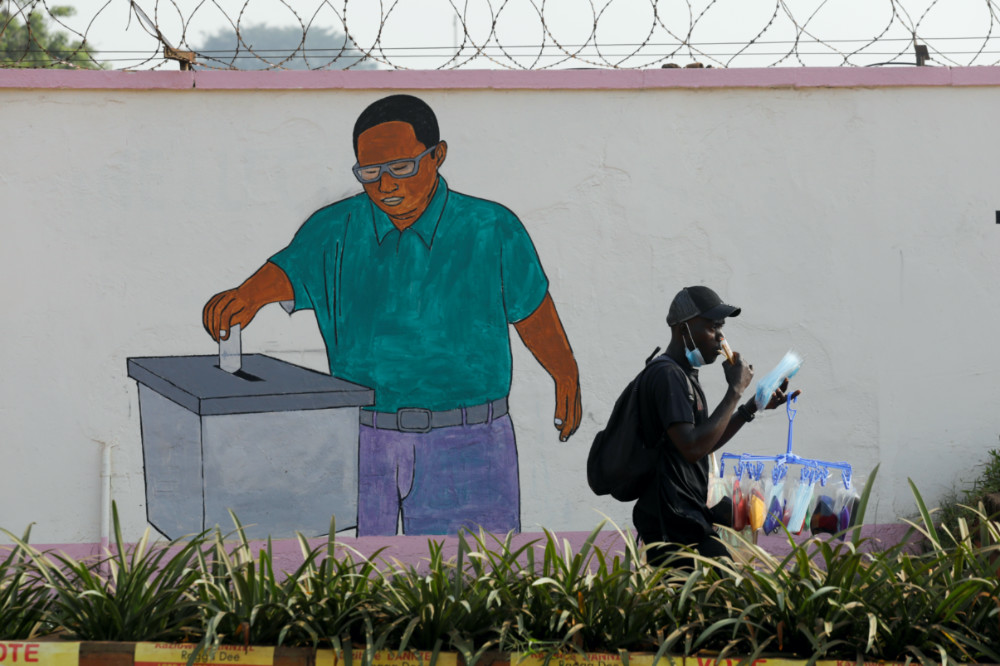Nairobi, Kenya
Thomson Reuters Foundation
Uganda’s ban on social media days before presidential elections shows a rattled President flexing power over the Internet at the expense of free speech and citizen rights, digital campaigners said on Wednesday.
Tuesday’s ban by President Yoweri Museveni – who said he only acted because Facebook had removed accounts that backed his National Resistance Movement party – came two days before elections that opponents hope will end his 35 years in power.

A man walks past a painting on the wall of the Ugandan electoral commission compound in Kampala, Uganda, on 13th January. PICTURE: Reuters/Baz Ratner
Campaigners said the mass switchoff – from Skype to Snapchat – robbed people of a voice in a blatant bid to cement the East African leader’s precarious hold on power.
“The NRM government has increasingly become hostile to the dissenting opinions, and cracked down on the political opposition, civil society and media,” said Juliet Nanfuka from CIPESA, an organisation that promotes digital rights.
“This democratic regression is likely to continue as opposition to Museveni’s 35-year regime mounts, and the digital sphere that is a source of mobilisation and information for ordinary citizens is unlikely to remain free.”
Internet monitor NetBlocks said on Wednesday that connectivity had been shut down by government order across most of Uganda as of 7pm local time, leaving citizens in an information vacuum on the eve of election.
Thursday’s election pits 76-year-old Museveni – in power since 1986 – against singer-turned-lawmaker Robert Kyagulanyi, also known as Bobi Wine, who has gained huge popular support.
Campaigning has been blighted by crackdowns on opposition rallies that have left more than 50 dead, and intimidation of some opposition candidates, their supporters and campaign staff.
In the run-up to the election, digital rights researchers said they had witnessed an increasing campaign of misinformation online, leading to violence against opposition supporters, ordinary citizens and the media.
They reported disruptions to platforms such as Google Play, with apps blocked from download, and growing attempts to silence social media accounts sympathetic to a restive opposition.
On Tuesday, the sporadic campaign of interference was overtaken by an outright ban on social media sites, with Museveni apologising for any inconvenience.
He said Uganda had no choice after Facebook took down a network linked to Uganda’s ministry of information for using fake and duplicate accounts ahead of the election.
Nanfuka called it “a familiar electoral trend in Uganda”, recalling bans on social media and money transfers in 2016, censures of SMS in 2011’s polls, and a block as far back as 2006 of sites that criticised the government.
Just last month, said Nanfuka, the government asked Google to block 14 YouTube channels seen as supportive of Wine. Google refused, saying that it would require a court order.
Tweet-free
The mass ban hit a slew of platforms, including Facebook, Twitter, WhatsApp, Instagram, Skype, Snapchat and Viber, according to Internet monitor NetBlocks. Authorities have not said how long the shutdown will last.
According to DataReportal, there were 2.5 million social media users in Uganda in 2020 – almost 14 per cent of the country’s 18 million registered voters.
The ban came days after US President Donald Trump was shut out of Twitter, showing the growing power of social media to mobilise political movements, often free from regulation.
Researchers say the trends paint a concerning picture, especially as the pandemic has turned the Internet into a key avenue of engagement for many isolating Ugandans.
Disrupting an online exchange of views not only raises concerns for democracy under COVID-19, they said, but reveals a trend for worsening digital rights and privacy under Museveni.
The government has brought in a host of laws and policies that restrict digital rights, they said, be it conducting surveillance or intercepting private communication.
Prominent critic Stella Nyanzi was charged under sections of the Computer Misuse Act, and sentenced to 18 months in jail after she wrote a Facebook post critical of Museveni.
The government has also trained up staff and bought in technology to watch its population, be it to crack encrypted messages or track movements via facial recognition.
Other measures include the licensing of online content, to include bloggers and broadcasters, and a tax on social media.
Campaigners say authorities have also been reluctant to protect privacy online and ensure free access to information.
“People can be surveyed without their knowledge. Their privacy is being invaded and personal data used without their consent,” said Allan Sempala Kigozi, head of legal at Unwanted Witness, a Ugandan digital rights group.
“All in the interest of ‘national security’ according to the government, but it is used against critics.”




